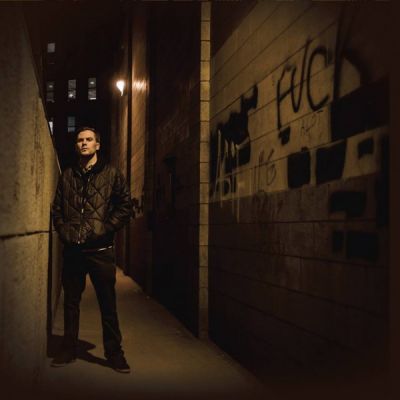Home > Rock
08/11/2015
Holy Son's Emil Amos: Searching for Clarity
BY ROBERT HAM // Amos takes his solo project back to the studio and wonders 'how much of this music the world needs'
by Robert Ham
There’s a reason why the music lovers of the world went into paroxysms of panic when Joni Mitchell got sick recently, or why people are going to be making movies about artists like Elliott Smith and Kurt Cobain for years to come.
When they sing a song, there’s no doubt that every word is leaving a little acid burn on their tongues as they fly into the air. They feel every lyric they write, deeply, and you, the listener, in turn responds to that emotion just as deeply.
That’s the same feeling that radiates from every album released by Holy Sons, the solo project of prolific and prodigiously talented Emil Amos. He holds nothing back, using his songs as a form of therapy to explore his personal failings, existential fears and philosophical studies in plainspoken, affecting language.
“Music is really the one area where I’ve been able to use and abuse the therapeutic method,” Amos said, speaking recently from his home in Brooklyn. “I feel pretty lucky that I’ve been able to get away with what I’ve been able to get away with. And I feel healthier for it. Healthier than I used to.”
His latest volume of this voluminous project is the recently released Fall of Man, a deeply felt collection of lush 70s-style Pop, gently rendered Art Rock, and Psych Folk that encourages you to lean in and get lost while you willingly let the barbs of his lyrics stick in your skin. The slow burn of the opening track “Mercenary World” delicately slips in stinging lines like, “Placing the whole world behind my back/no I can’t be wounded/If I never look back,” and the sweet swing of “Being Possessed Is Easy” reminds you that “fear and fatigue will leave impossible stains.”
The album also feels like the culmination of everything Amos has recorded as Holy Sons. Early efforts as a teen in North Carolina or with his friend Duncan Trussell in L.A., and collected on the Lost Decade series, were recorded using hand-held tape machines or a cheap 4-track. More current work still had a slightly janky quality, even though they were made using computers. For Fall of Man, Amos used actual studios in his former hometown of Portland and back in New York. As a result, the songs have a much sharper focus and a more enveloping quality to them.
“It’s a very specific challenge to take Holy Sons and put it in a studio,” he says. “This isn’t just your basic, polished classic rock sound. This is someone that’s really trying to communicate something. I have to protect the early tenets of the lo-fi recording experiments and preserve that, no matter what situation I’m in.”
Amos was also a little wary about putting himself into another studio after having spent so much time over the last few years working with his many other projects: the Avant-Metal band Om, his freewheeling psychedelic instrumental collective Grails, and the Hip-Hop experimentalism of Lilacs & Champagne. Plus there was the added pressure of having to possibly pay heed to outside voices with producers like Jeff Saltzman and Al Carlson now in the mix. But to hear Amos talk about it, those studio heads generally took a back seat and let him steer the sessions for Fall of Man right where they needed to go.
Because, even with the occasional guest performer like Trussell or his Grails bandmate Jay Clarke, or even with the touring band that is going to be helping perform his work live through the rest of 2015, Amos is insistent that Holy Sons is hisproject and subject only to his concerns, whims, and emotions.
“The reason why any of us do this is that we expose ourselves in the form of basic poetry,” he says. “If you take that out of music, you just end up with entertainment. There’s so much of that shit in the world that there’s no reason for me to add to that just because someone thinks I’m good at drums and guitar.”
What he’s less clear about, in spite of great reviews and the many notes of support he’s received from fans over the years—not to mention the support of his label Thrill Jockey, one of the biggest indie imprints around—is whether anyone really wants to hear what he has to say.
“I don’t know how much of this music the world needs,” he says, with a note of exasperation in his voice. “While someone like me might feel like they need it, I don’t think most people acquire a taste for it. Sometimes it’s pretty easy to get confused and jaded about it all. I’m on my own little planet and, as long as I feel like there’s something I haven’t covered as an internal journalist, I’ll always see a void that needs to be filled.”








